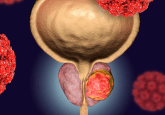Prostate cancer test shows promise for identifying high-risk patients

Researchers at the Institute of Cancer Research (ICR) (London, UK) have developed a novel prostate cancer DNA test that can identify patients who have a high risk of developing prostate cancer in their lifetime. This could offer faster diagnosis and earlier treatment; potentially reducing prostate cancer cases.
Recently published in Nature Genetics, the test combines 63 new genetic variations in the DNA code that increases risk of prostate cancer, with over 100 other genetic variations previously linked to the disease.
The study used a novel DNA analysis, Oncoarray, to compare more than 500,000 single letter changes in the DNA code of 80,000 men with prostate cancer and 61,000 men without the disease. Many of the new genetic variants discovered were found in the region of genes involved with immune cell communication.
The test identifies the 1% of men who are at a six-fold increased risk of developing prostate cancer compared to the average population because they have inherited many of these genetic variants.
Also in the news:
Researchers at the ICR now believe they can account for 30% of a man’s inherited risk of prostate cancer, which could be enough to start using the information in practical testing strategies.
The next step is a trial of a DNA test on saliva samples taken in GP practices, to evaluate whether advice or preventative treatment has the potential to reduce prostate cancer cases among those men found to have a higher inherited risk.
Paul Workman (ICR) commented: “We have seen dramatic progress in recent years in our understanding of the genetics of prostate cancer, and this new research is another big step forward that tells us more about why some men develop the disease and others don’t.”
He concluded: “We are on the cusp of moving from theory to practice – from explaining how genetics affects prostate cancer risk, to testing for genetic risk and attempting to prevent the disease. This study also gives us important information about the causes of prostate cancer and the potential role of the immune system, which could ultimately be employed in the design of new treatments.”
Source: www.icr.ac.uk/news-archive/prostate-cancer-dna-test-identifies-men-with-six-fold-increased-risk





